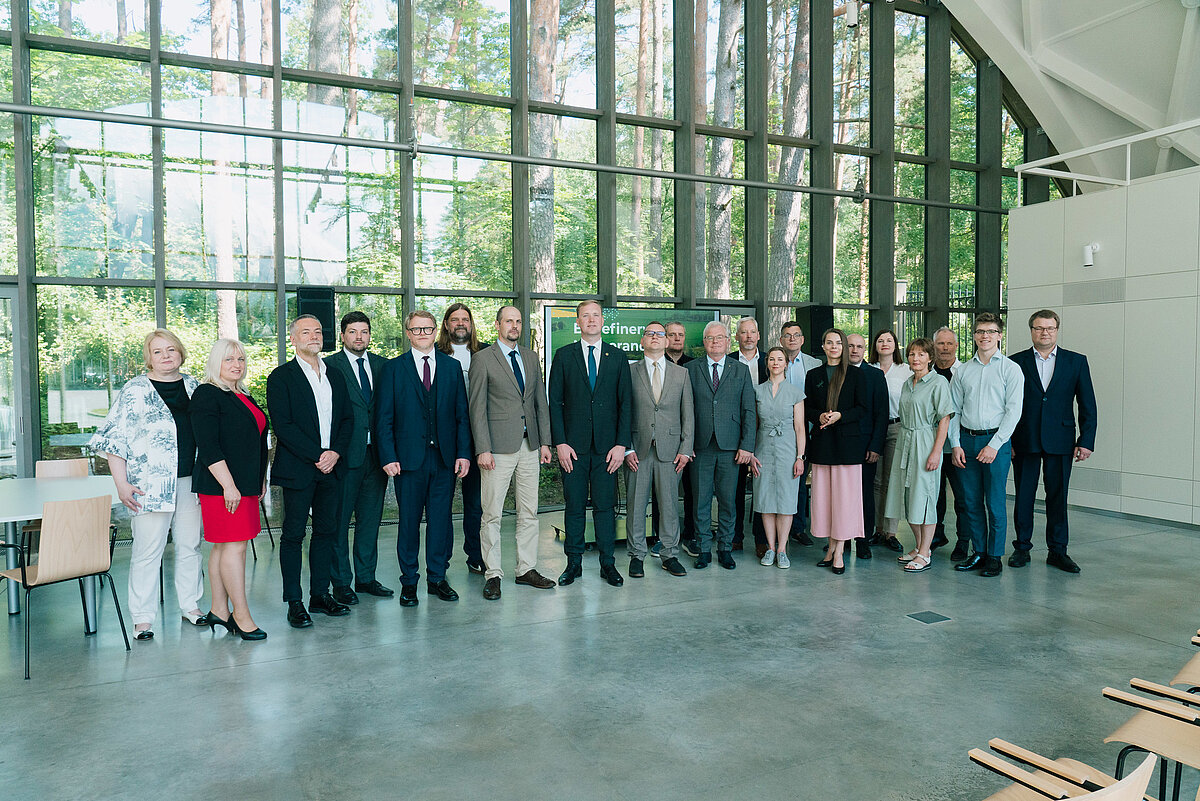
Minister of Economics Viktors Valainis: "The biorefinery Memorandum marks the beginning of a new chapter for the Latvian economy. It represents a significant stride towards our objective of doubling the size of the country's economy within the next decade. Collaboration between businesses, scientific institutions, and public administration will accelerate our progress toward this goal."
Biorefinery is a fast-growing industry that converts biomass into energy or consumer products for use in building materials, the food industry, and other areas. Six Latvian companies, several universities, research institutions, and public administrations are expected to sign the Memorandum of Understanding.
Edgars Ruza, a Board Member of ASNS Ingredient, also signed the Memorandum, highlighting Latvia's competitive advantages in this sector. "Latvia is a green country with extensive forest resources and a well-developed agricultural sector, ideally suited for this industry's growth. We intend to begin constructing our pea protein plant in Jelgava by October, with production set to commence in late 2026 or early 2027."
The bioeconomy is currently the most significant contributor to Latvia's manufacturing industry. Its total exports in 2023 amounted to €7.86 billion, but since 2014, the level of export production has almost doubled. The sector provides 125,000 jobs and has enormous potential for developing the Latvian economy.
Raivis Bremsmits, Director General of the Investment and Development Agency of Latvia (LIAA): "Latvia is an export nation, and bioeconomy is our natural advantage. Biorefinery as a new knowledge-intensive industry provides us with vast development opportunities in attracting investments and increasing the volume of exports to 80% of the gross domestic product."
Biorefinery is a process that can extract high-value-added products from biomass. While biomass was previously exported abroad in large quantities, the conditions are now in place for processing it within Latvia. There is a growing consumer demand for "green products" in export markets - this is a great opportunity for Latvia to exploit its natural advantages. Companies such as Fibenol, which plans to invest up to €700 million in developing biorefinery, will make an essential contribution to the sector's development.
Biorefinery allows up to 90% of biomass feedstocks to be converted into materials widely used in building, pharmaceuticals, cosmetics, textiles, food processing, and other industries, replacing fossil resources and chemicals. Biorefinery produces biofuels, bioplastics, various essential oils and food supplements, cellulose, animal feed and fertilizers, and other valuable products. In this way, the ecological footprint of the production process can be reduced, and the final products can be made more environmentally friendly.
The Memorandum promotes good governance and initiatives to support and stimulate the development of new value chains from bio-based materials sourced locally, calling for a focus on the final product in Latvia. This approach ensures that the economic benefits, job creation, and sustainable practices associated with biorefinery projects capitalize on bioeconomies specific to Latvia while contributing to regional development.
An action committee will be established to facilitate the exchange of information and ensure cooperation among industry, universities, research institutions, and public administrations.
The Memorandum on the establishment of a biorefinery ecosystem is signed:
Biorefinery value chain companies: “ASNS Ingredient” SIA Board Member Edgars Ruza; “Fibenol Latvia” SIA Site Selection and Planning Manager Merili Palu; “Aloja – Starkelsen” SIA CEO Maurizio Decio; “Field and Forest” SIA Board Member Gundars Skudrins; “Biolat” SIA Chairman of the Board Eisaks Arvis; “Bio-Venta” SIA Board Member Indulis Stikans,
State institutions: Minister of Economics Viktors Valainis; Raivis Bremsmits, Director General of the Investment and Development Agency of Latvia; Normunds Smits, Parliamentary Secretary at the Ministry of Agriculture; Edvards Francis Kuks, RIS3 Team Manager at the Ministry of Education and Science; Janis Irbe, Parliamentary Secretary at the Ministry of Climate and Energy; Armands Eberhards, Deputy State Secretary for European Union Funds at the Ministry of Finance; Girts Dubkevics, Parliamentary Secretary at the Ministry of Transport.
Higher Education Institutions: Gundars Berzins, Rector at the University of Latvia; Talis Juhna, Rector at the Riga Technical University; Sandra Muizniece-Brasava, Head of Technology and Knowledge Transfer Department at the Latvia University of Life Sciences and Technologies; Santa Vitola, Head of the Open Innovation Center at the Vidzeme University of Applied Sciences
Scientific Institutions and Foundations: Ugis Cabulis, Director Assitant in Scientific Work at the Latvian State Institute of Wood Chemistry; Elina Dace, Foundation "Baltic Studies Centre" Leading Scientist; Ineta Stabulniece, Director at the "Institute of Agricultural Resources and Economics"; Olga Vilcina, Director at the Institute of Food Safety, Animal Health and Environment "BIOR"; Gundars Skudrins, Board Member of the Foundation" Institute for Environmental Solutions."

 LU konference
LU konference